IN-DEPTH |
Twenty-seven minutes. That’s all it took for me to get kicked out of a so-called internet café.
I walked into Red Rubby, located at 715 S. Glenstone, at 12:41 p.m. It was empty besides the main clerk, who would later tell me his name was John Mack. I suspect it was a fake name.
The Springfield City Council is set to vote on a bill at its Feb. 12 meeting that would effectively bans video lottery terminals, or VLTs, in the city. Sponsored by council members Monica Horton and Matthew Simpson, the ban would prohibit the operation of entertainment devices that offer monetary prizes.
The main room at the Red Rubby is surrounded with a row of devices that offer monetary prizes, also known as ‘no-chance games.’ Mack comes out to greet me, and inquires about my notebook. I’m a reporter, I say, and I’m just trying to figure out how these machines work.
He seems friendly, at first. Mack says the owner is from out of state and that it’s usually pretty dead in the afternoons. It will likely fill up after 6 p.m.
Red Rubby has a 2023 Springfield business license, issued to owner Manvear, LLC, according to City of Springfield licensing records. Manvear, LLC, is registered to Corporate Service Center, Inc, in St. Louis, according to Missouri Secretary of State records. No individual names are affiliated with the business.
“Any of the machines hot?” I ask.
He points me to the first one in the corner, an NCG Suite made by Banilla Games.
I sat down, put $5 in and let, err, well, the games begin.
An outright ban or a targeted approach?
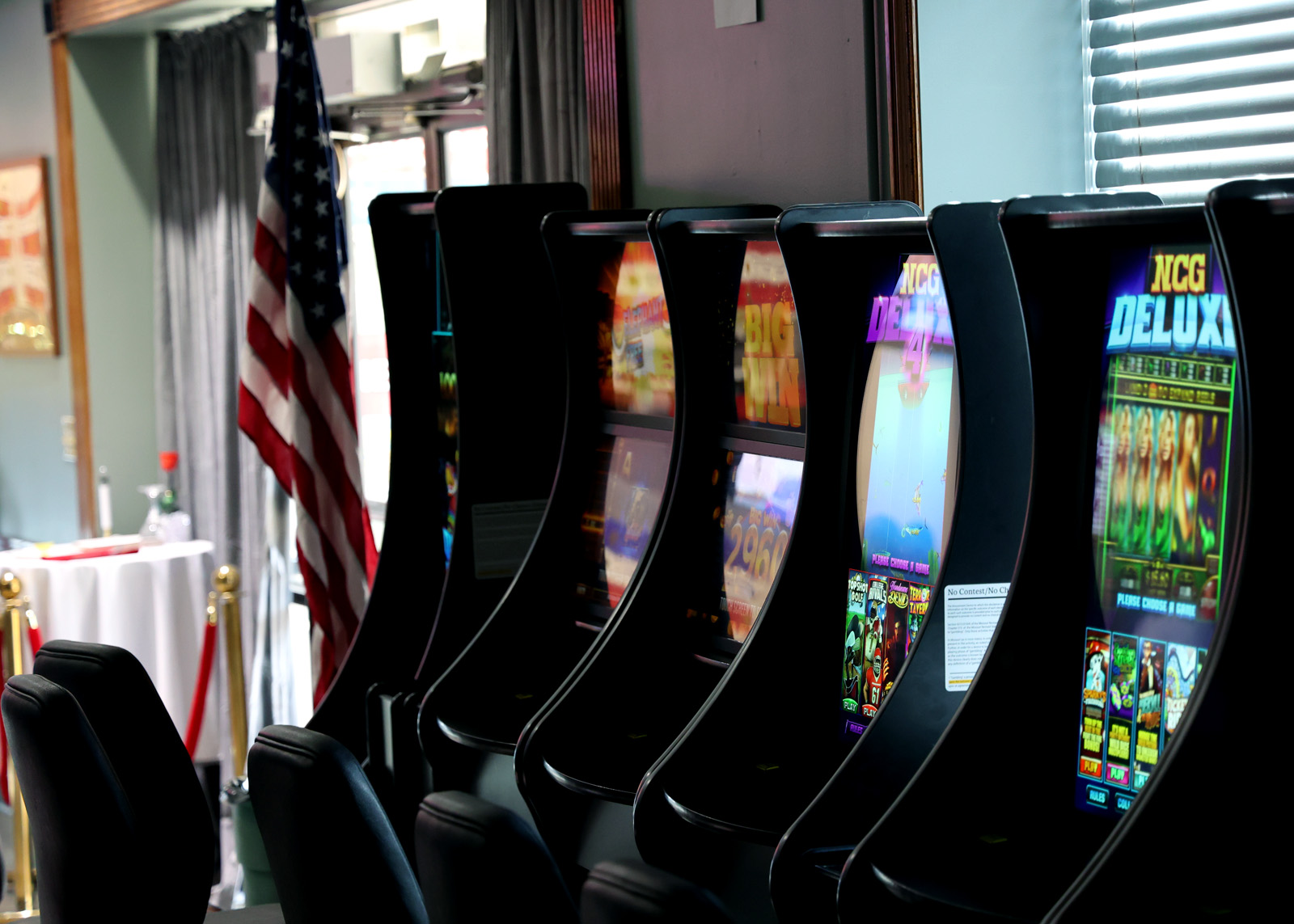
The Jan. 22 public hearing on the council bill featured conflicting views on the proposed ban, with the majority of citizens voicing their support for its adoption and a few speakers asking the City Council to take a more tailored approach.
VLTs have troubled Horton and Simpson for the last couple of years, but Horton said she was not able to make progress on any legislation until the concerns of business owners in the Plaza Shopping Center — which has game rooms — were publicized.
Many of the concerns for advocates of the ban are rooted in public safety, with claims that VLTs and the businesses that host them attract criminal activity, which in turn affects surrounding businesses and neighborhoods. Additionally, proponents of the bill argue the machines prey on disadvantaged people, who Simpson said are “wagering money they can’t afford to lose.”
On the other hand, those opposed to the ban acknowledged the concerns of standalone gaming rooms, and suggested VLTs be allowed to continue to operate in other types of businesses — like fraternal organization halls and gas stations, which they allege aren’t causing the same problems.
Despite the appeal for a revised approach, Simpson is pushing forward with the bill as it is currently written.
“The operation of the machines is the same… I don’t think we can pick and choose who gets to operate these, nor should we,” Simpson said. “I think that the problem is inherent to the way these machines operate and needs to be addressed accordingly.”
While sympathetic toward businesses that have become dependent on revenue from VLTs, Horton also plans to vote in favor of the ban “unless there is a compelling reason not to.”
“Small businesses have taken a chance by putting their eggs into this basket of illegality with few willing to prosecute which promotes a predatory business practice that does little, if anything, for economic vitality, quality of place, nor neighborhood revitalization,” Horton said.
Simpson said the city government has explored other courses of action to put an end to VLTs in Springfield — including working with the Greene County Prosecuting Attorney’s Office — before landing on the bill at hand.
“We really tried all the different avenues we could take to address this problem without having to pass something locally, and those avenues were not working,” Simpson said. “So this was ultimately the solution that it will take to address these in Springfield.”
The Prosecuting Attorney’s Office did not respond to interview requests regarding VLTs by deadline for publication.
How it works
Editor's Note: As part of the reporting for this story, Hauxeda reporter Ryan Collins played games and tried to talk to employees at game rooms in Springfield.
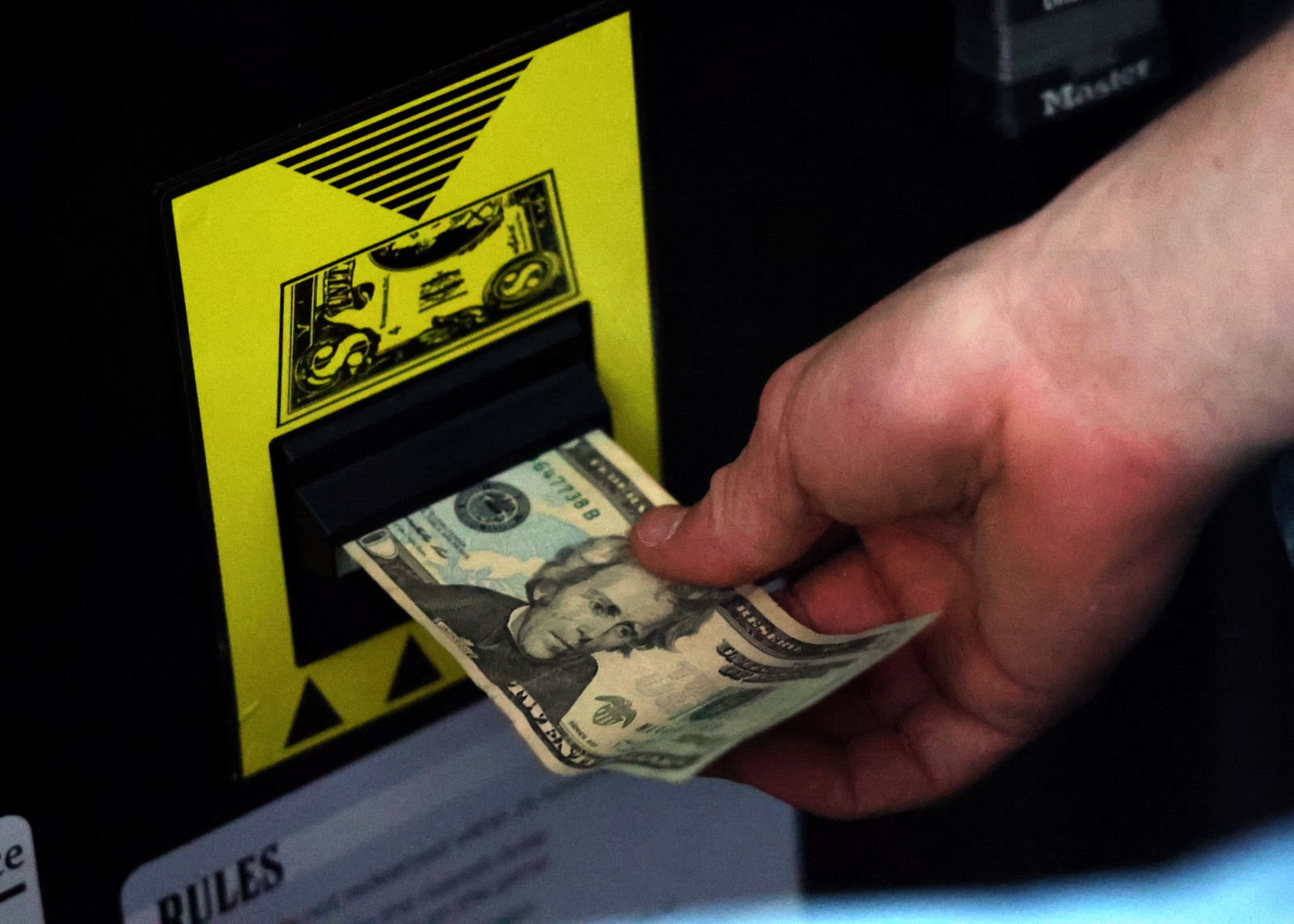
A single machine usually has multiple games you can play. Each machine at Red Rubby had five game options. The NCG Suite had five games with names like “Red Hot Buffalo,” “Piggy’s Big Break,” and “The Great Train Robbery.”
I put in $5. I picked the game “Plundering Pirates.” I choose my bet: 25-cent to $3 increments. The bigger the bet, the bigger the possible payout. I’m playing to figure out the games, so I start slow. I make a 25-cent bet.
Before I touch anything else, there’s a button in the corner of the screen labeled “Check Prize Viewer.” I hit it. It says the next spin will payout $0.00.
No good. I’m playing to win. I increase the bet to 50 cents and hit the prize viewer again. $0.00 again. Dang.
It’s not just not my day. This is how these games go. They’re called “no-chance” games for a reason. That's only a joke.
Torch games fueled by scripts
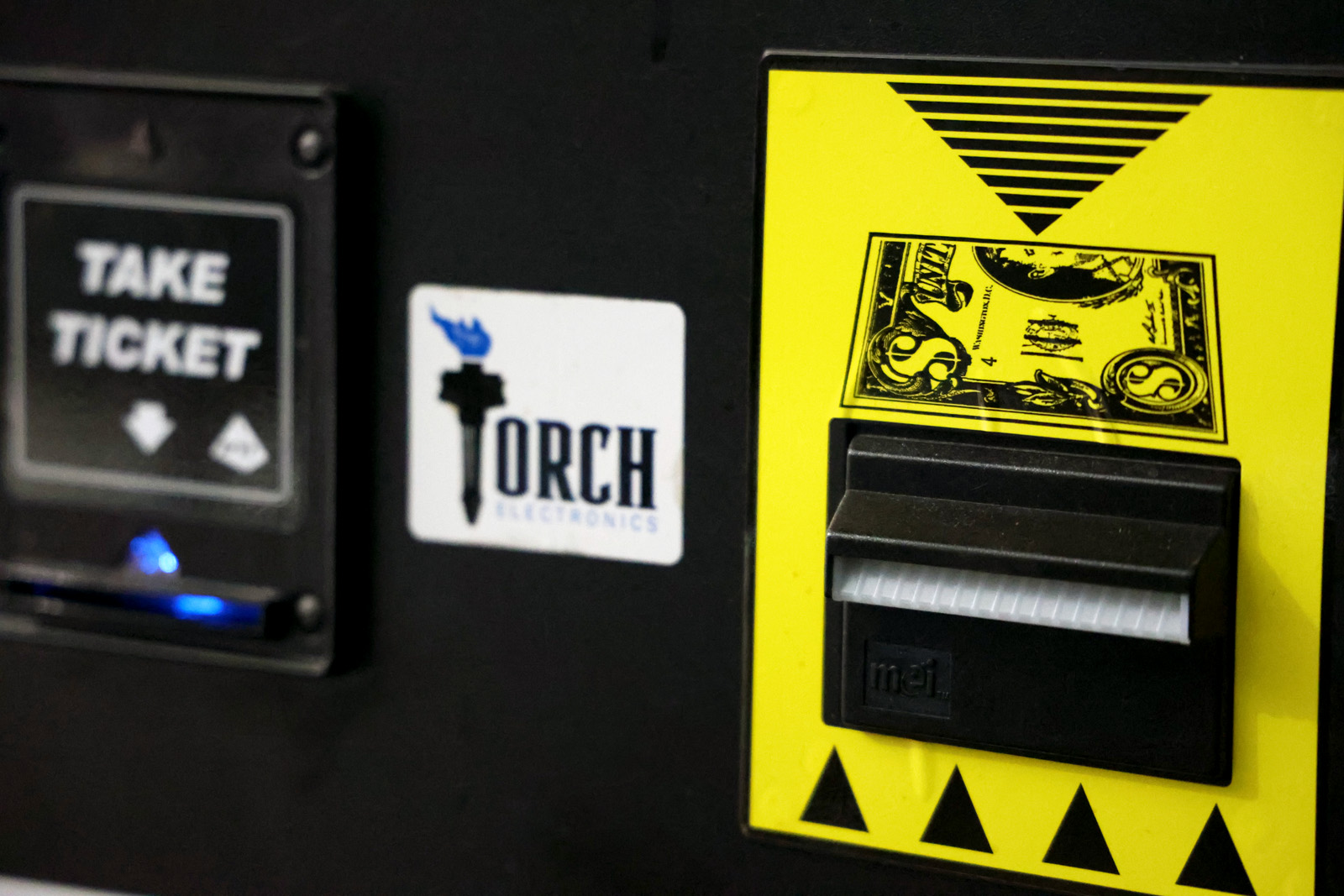
They’re called “no-chance” games because they have predetermined winners. Unlike true gambling games, which involve skill, like poker or blackjack, or completely randomized winners like the slot machines at a casino.
That’s how game makers like Torch Electronics make machines that exist in what some call “the gray area” of the law. Their machines run off scripts, which include predetermined winners, said Gregg Keller, Torch company spokesman.
“The Missouri Constitution is pretty clear about what constitutes a gambling device, and it needs to be a game of skill that could be like poker, for instance, or a game of chance,” Keller said. “Ours is neither. Our games adhere to the letter and the spirit of the law.”
Torch machines are not in places like the Red Rubby. Torch has machines in Springfield bars, gas stations and private clubs.
Torch machines “run off of a pre-approved script that have a certain number of wins and losses on a script,” Keller said. “Then when the script is over, it starts over from the beginning of the script again.”
The scripts are created using a proprietary algorithm, Keller said. Because of the script, the machines stick to Missouri law, he said.
“Importantly, the player may view each and every outcome which may entitle them a prize before playing the game,” the company wrote on its website. “They may simply touch the ‘Prize Viewer’ button on the game console and view the result of the game before playing. As such, the player can decide if they want to play the game or not based on the predetermined outcome.”
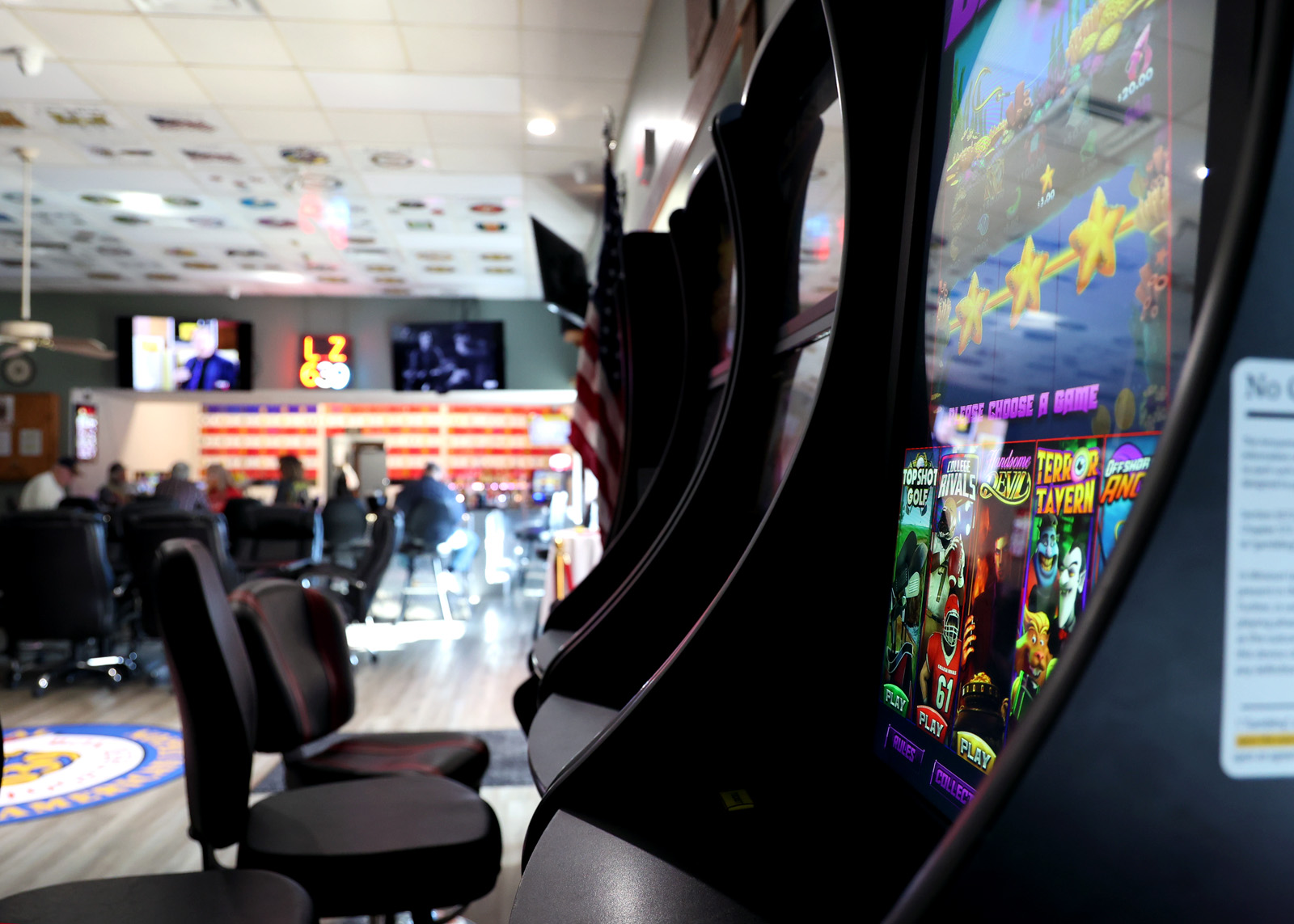
Keller said Torch could not quantify the number of machines the company operates. The company put its first machine in Missouri in 2019, Keller said.
“We’re in every region of the state,” Keller said. “We can’t quantify how many we have across the state, but they’ve been operating in the state and in the region for years now…with our for-profit and nonprofit clients.”
Torch does not have any machines in “gaming rooms,” or stand-alone businesses that are separate from gas stations and bars operating no-chance games, Keller said.
“We have no interest and, frankly, there’s a lot of risk for us as being similar or akin to these illegal game rooms,” Keller said. “We do care where [Torch machines] go in because we are an ongoing Missouri-based business that’s active throughout the state, active in business communities, active in charities, active in legislation moving through Jefferson City.”
Data doesn’t definitively back public safety concerns
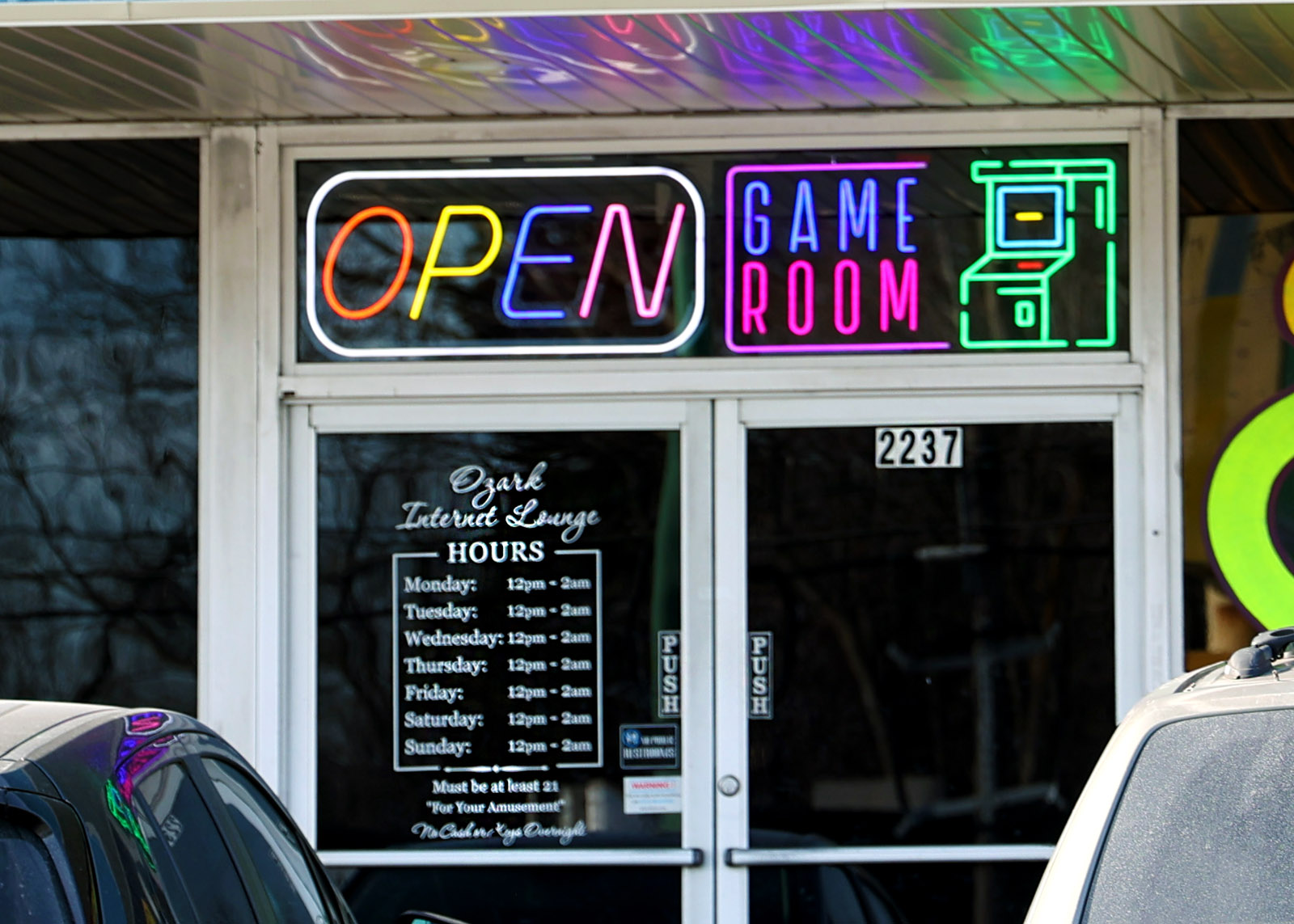
Despite the narrative that gaming lounges are a hotspot for criminal activity, Springfield police data paints a muddier picture.
The Springfield Police Department compiled the total number of dispatched calls for service and police reports filed within 250 feet of 19 different locations — and 23 gaming lounges — in Springfield. It's unclear if the police department report includes all gaming lounges: the Daily Citizen has identified at least one game room, Spin City at 2551 W. Kearney St., that is not in the report.
The report looks at total calls and police incidents that have occurred at each location since 2014 through the third quarter of 2023, even though most of Springfield’s game rooms opened within the last couple of years.
In some instances, there is a documented increase in criminal activity. The Plaza Shopping Center on South Glenstone Avenue has hosted game rooms longer than any address in the report — since 2014. Though calls for service and police reports are down from their 2021 peak, they remain higher than most other monitored locations, and the shopping center’s 2014 figures.
There has also been a measured increase in dispatched calls and a slight rise in police reports within 250 feet of the Ozark Internet Lounge, located at 617 W. Division St., since it opened in 2022.
In other instances, however, calls for service and incidents have remained relatively flat, or even decreased, since a game room opened.
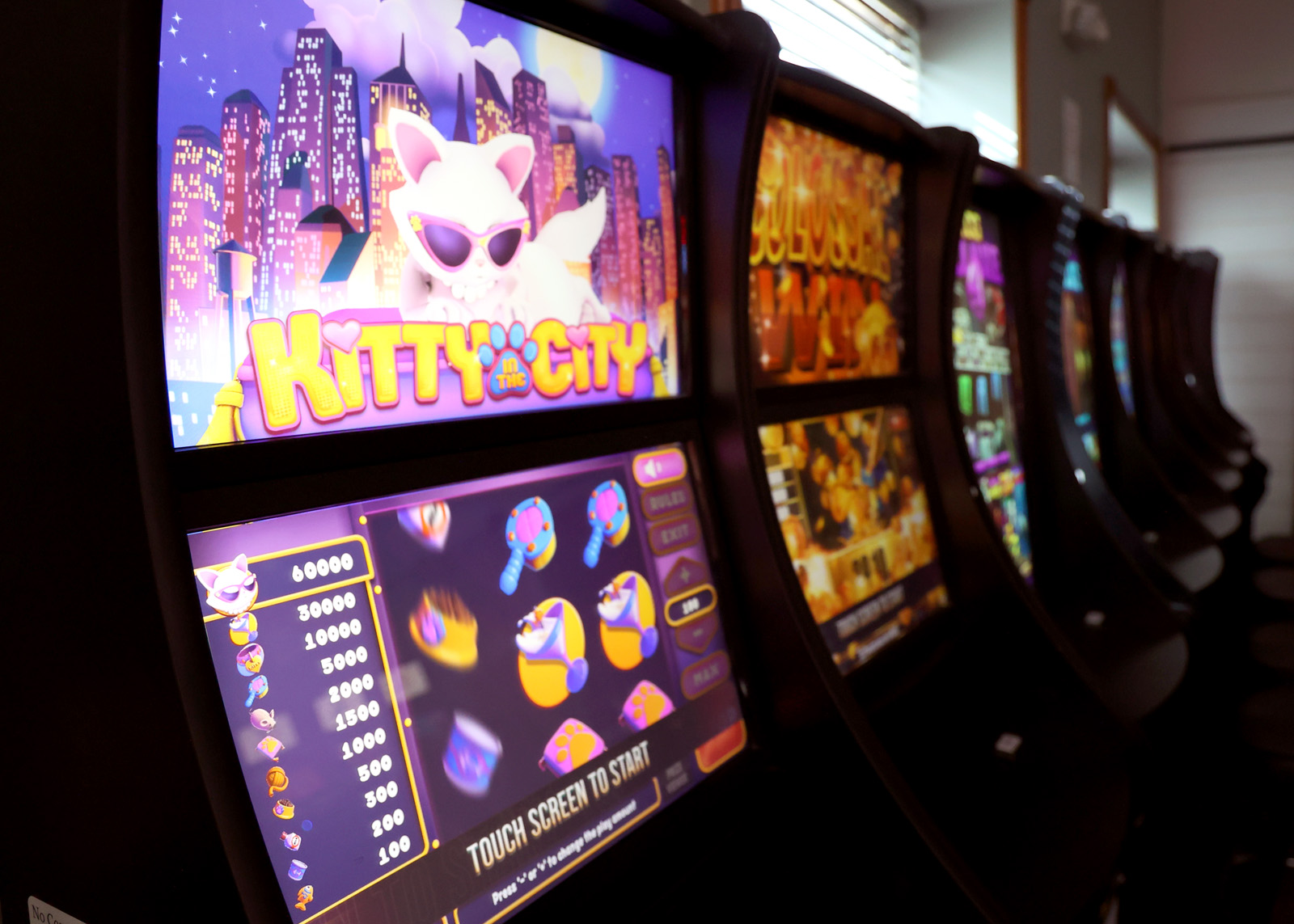
Though the report doesn’t include locations other than stand-alone game rooms, Maj. Tad Peters of SPD said officers are monitoring other businesses that have VLTs. Based on calls and complaints of crime happening around game rooms, Peters said police expected to see a significant change in the number of calls and incidents when they put together the report.
“When we did this research, we were surprised to see that the numbers don't really play that out,” Peters said. “So I think what we're seeing is visible activities going on. When a person is standing there or going to a restaurant at the [Plaza] Shopping Center, they're seeing the clientele in the area and feeling uncomfortable and, you know, seeing certain things happening. But it's not something that plays out as far as calls for service numbers.”
Simpson said it is important to consider qualitative evidence as well as quantitative data, and noted that some of the problems aren’t occurring in the immediate vicinity of businesses that have VLTs.
“The crime definitely spills out to the surrounding area, which in some ways is worse, because it spills out into the neighborhoods and affects people's residences, as well,” he said.
Peters further emphasized that the police data doesn’t tell the whole story, and added that some types of crime aren’t being reported at all.
“It's easy to sit and listen to all those complaints, the statements made, the impassioned pleas and then go look at the numbers and it doesn't totally confirm but it also doesn't say that there's not a problem,” Peters said. “If you go hang out in that parking lot for a while, you probably feel like there's something going on.”
Continuing to lose at the Red Rubby
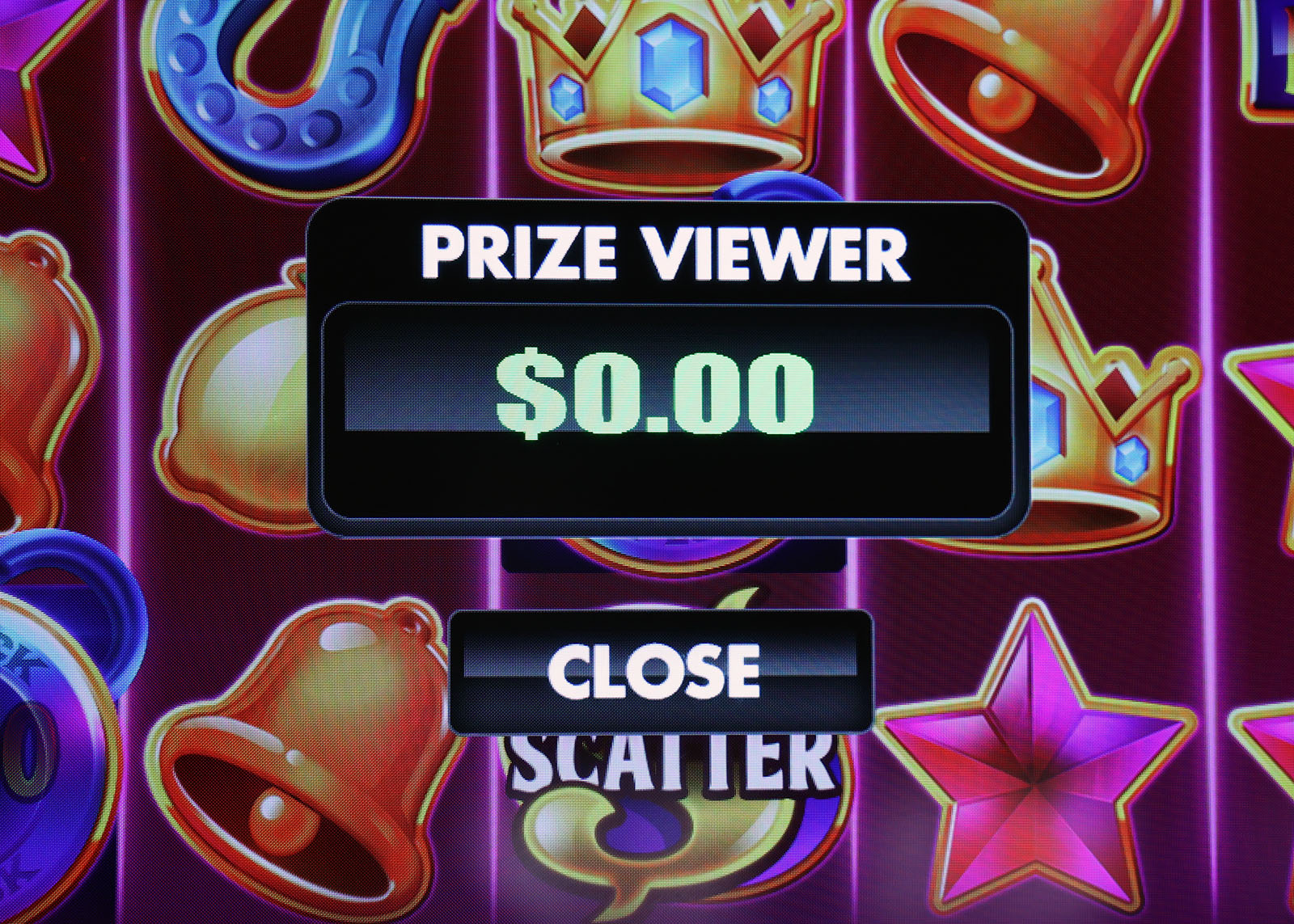
I hit $0.00. Again.
This is getting irksome. I’ve increased my bets incrementally all the way up to $3. It still shows I won’t win a penny on the next play. I give up. I play knowing I won’t win, but it will give me a new next play.
$0.00. Again.
That’s the overarching theme of the pre-reveal scheme. The majority of the time you will not win a cent. I exit out of “Pirates” and dive into “King Kong.”
I up the ante with a 50-cent bet. I hit the prize viewer button and wham! I’m set to win 30 cents. I play. And I win 30 cents.
The next time I hit “prize viewer” it shows $0.00. Again.
I go through this cycle for a bit, all the while asking Mack questions and doing my best to put him at ease. At 1:02 p.m., I had won twice, for a total of $1.10. And it was right about then that Mack received the phone call.
His demeanor completely changed as he spoke on the phone. Someone, presumably the owners, had called about me and my notebook. I play dumb and keep making 25-cent bets. I’m down to $1 and some change left in the machine.
1:06 p.m., Mack hangs up the phone and immediately says “We do not want to be in your article.”
I hit the play button again on a 25-cent bet. $0.00. Again.
I said I’m sorry, I wasn’t trying to get anyone in trouble. I’m just trying to figure out the games. He asks to see my notebook. I say no.
Mack tries to take my notebook. I say no. He tells me I can’t write down the names of the games. I get my notebook back.
Missouri legislature undecided on VLTs
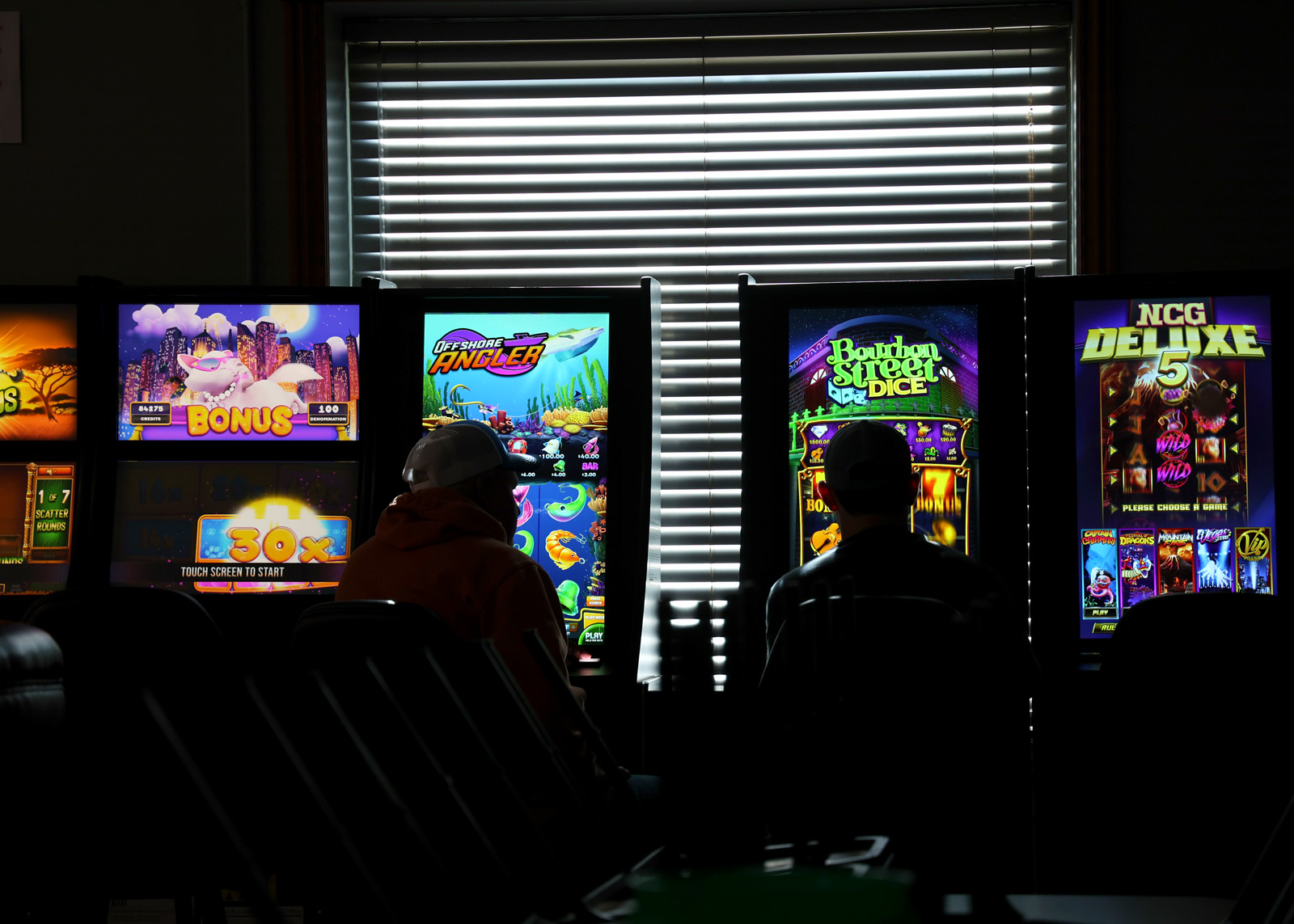
Video lottery terminals are often referred to as gray machines, a moniker that alludes to their position in a legal gray area. The machines aren’t explicitly legal or illegal under state law.
Among the Springfield City Council’s legislative priorities is a request for the Missouri General Assembly to “lawfully define video lottery terminals as illegal gambling devices under state law.”
Efforts to formally legalize VLTs are also happening in Jefferson City, and have been — albeit unsuccessfully — for several years. These endeavors are intertwined with a push to legalize sports betting, which has led to a deadlock that has prompted sports teams to launch an initiative campaign.
Section 572 of the Missouri Revisor of Statutes defines gambling as when a person “stakes or risks something of value upon the outcome of a contest of chance or a future contingent event not under his or her control or influence, upon an agreement or understanding that he or she will receive something of value in the event of a certain outcome.”
Gambling is limited to the state’s 13 licensed riverboat casinos, which are regulated alongside charitable gaming and fantasy sports by the Missouri Gaming Commission. The Missouri Lottery Commission oversees the Missouri Lottery. Gambling revenues are taxed at 21% in Missouri; federal and state tax rates on winnings vary depending on the amount won.
Maj. Peters said investigators in Springfield are checking to see if gaming devices have the pre-reveal function that distinguishes VLTs from gambling. Though the majority of what officers come across are VLTs, Peters said they have found some gambling machines.
In 2023, a circuit judge dismissed a lawsuit that was filed by Torch to stop the Missouri State Highway Patrol from investigating their machines across the state. At the time, Torch was facing felony prosecution in Linn County, Missouri, for promoting gambling. That case was also dismissed.
Reporter asked to leave the game room
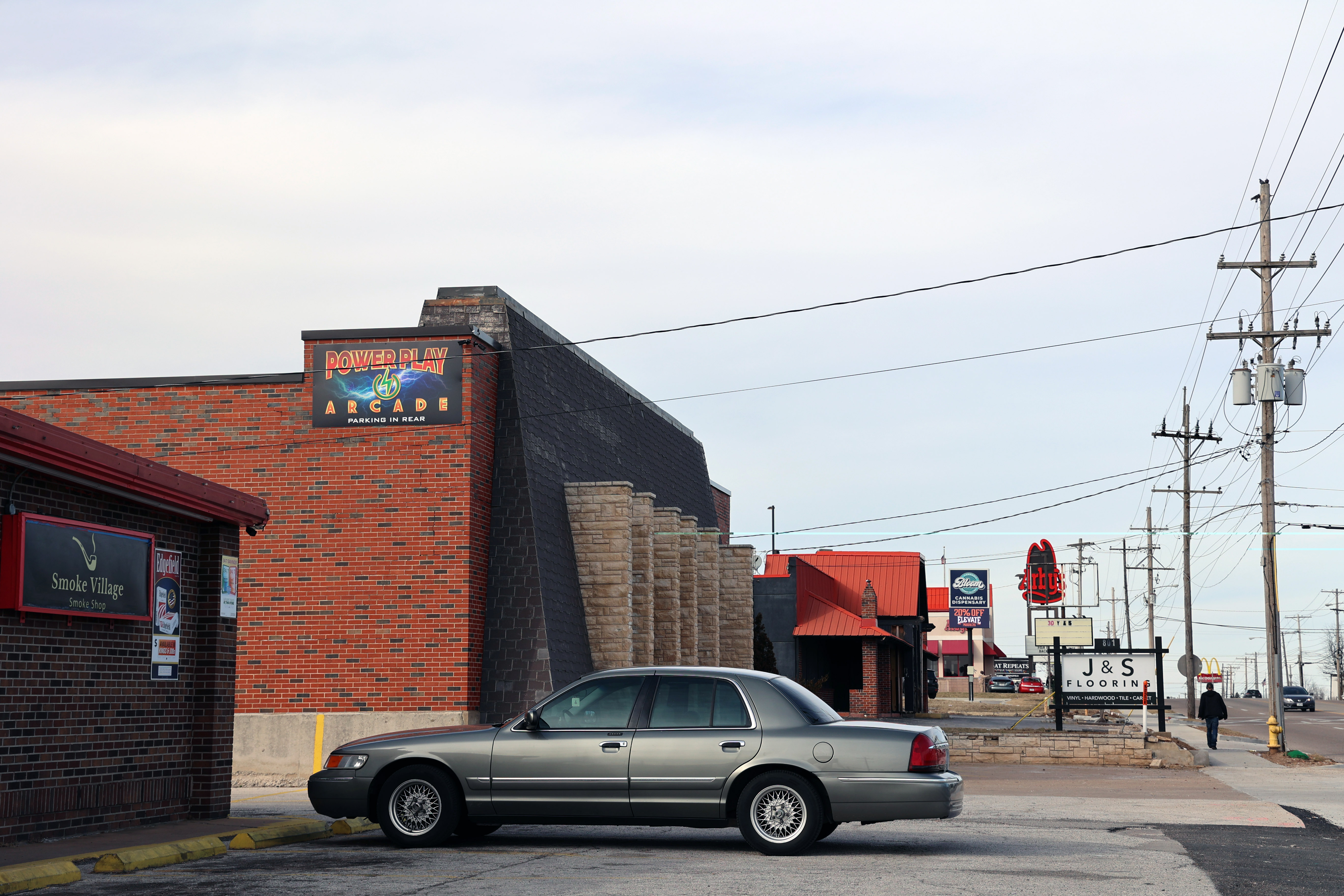
1:08 p.m. I don’t know what else to do, so I play again. I hit the prize viewer. Payout $8.25! That’s the biggest yet. I play. I win.
Mack asks me to leave, in a way that involves saying I’m making too small of bets and my writing down information is making him uncomfortable.
I abide, but not before I ask for my payouts. Mack looks at the machine, $9.20. He disappears to the back room and returns with $9 in cash. He looks down at my notebook as I write “kicked out at 1:08.” He laughs. I leave.
I decide I’ll take the $4 in winnings and not cause a scene.
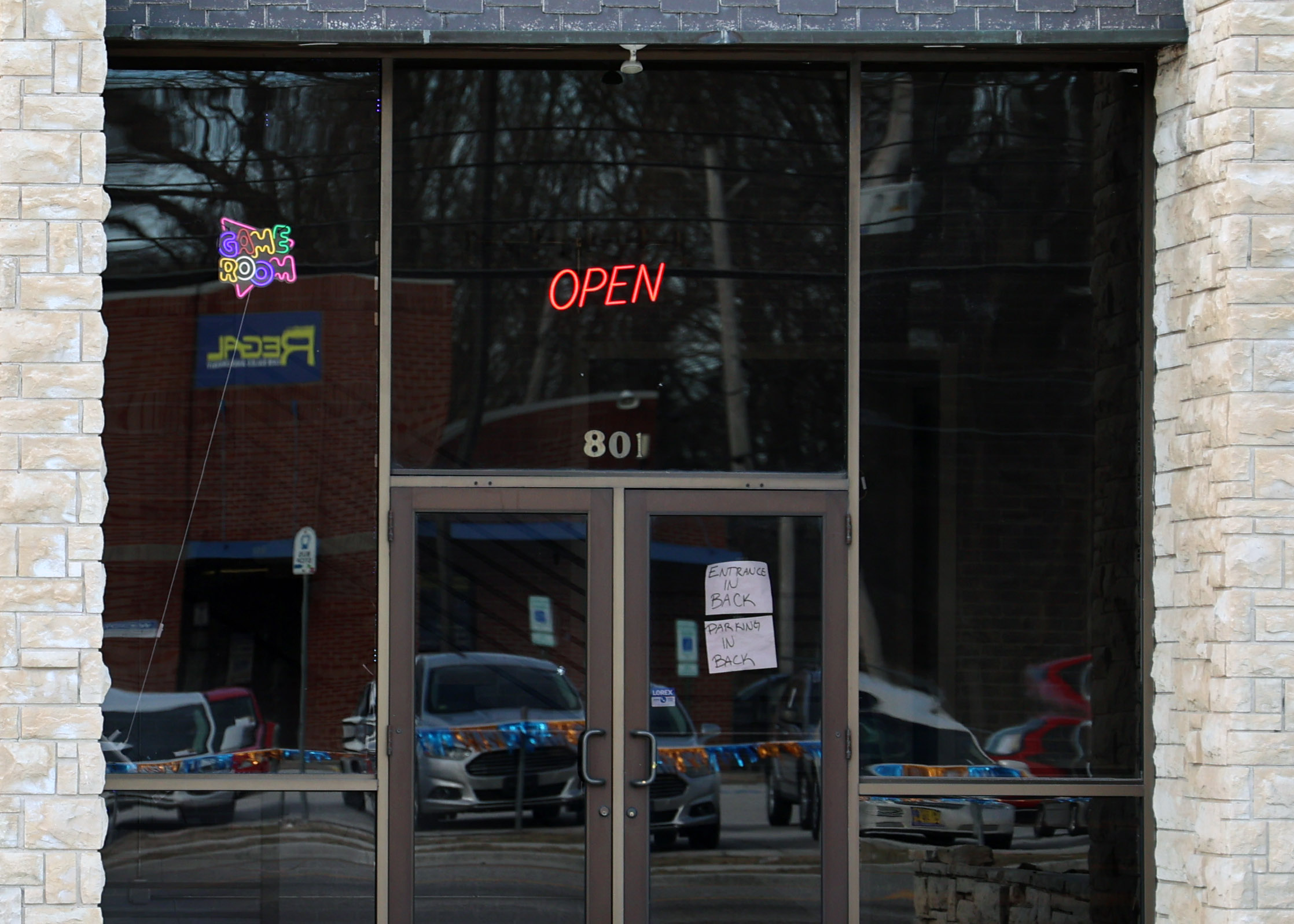
Gaming machines in bars, gas stations, fraternal organizations
At American Legion Post 639, which features Torch games, the payout works a little differently, just as it does at gas stations and bars across the city. The nonprofit veteran post features machines that print out a ticket with the payout amount, which a customer takes to the bar to receive their cash.
The American Legion post splits revenues from the machines 50-50 with Torch, Post 639 Commander Mike Goforth said. While the amount of money the nonprofit makes off the machines each month isn’t insignificant, it’s not enough that the post would shut down if they lose them, he said.
If the machines are outlawed, “it’s going to hurt us, but we're not going to close by any means,” Goforth said. “It’s definitely going to hurt the bottom line cause when you have these to help pay…it gives you more money available to complete our mission.”

Even in slow months, like December, Post 639 makes enough off the machines to cover its $2,500 utility bill, Goforth said.
Because the Legion is a nonprofit, it doesn’t pay any income tax on the winnings. As far as revenue is concerned, the Legion doesn’t handle any of it on premises. Instead, Torch has an employee that comes out once a week to collect winnings and reset the machines, Goforth said.
The Legion is likely to change its open-door policy soon, especially if the machines are outlawed at other locations but not at nonprofits, Goforth said.
“If we get to keep these machines and gas stations and stuff lose them, I know it’s going to bring a different element [of clientele] here,” Goforth said. "That I don’t want, so for the security of my members and family and friends, we’re going back to” locked doors all the time.
How is revenue from VLTs taxed?
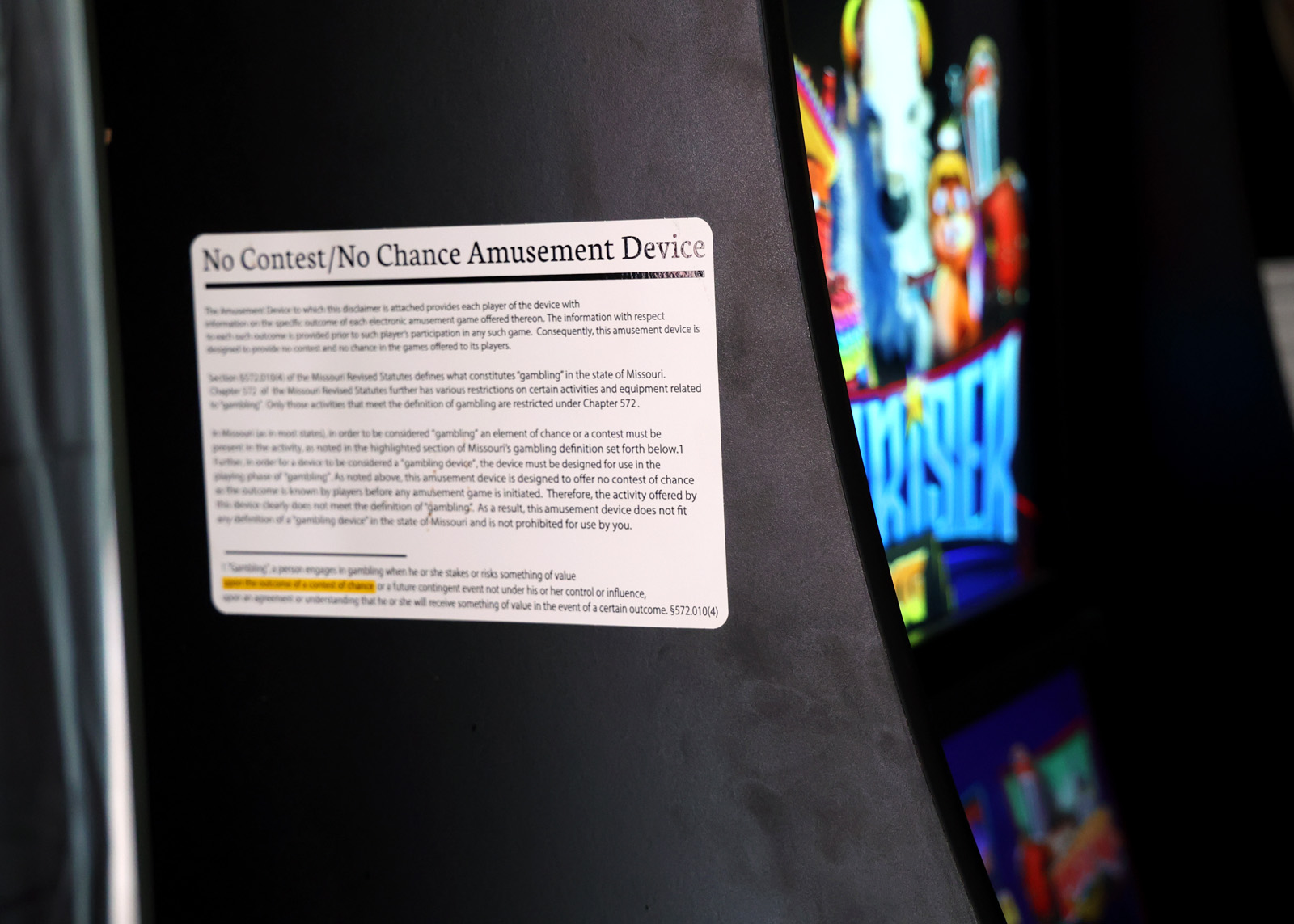
Revenue from the devices is subject to taxation at the federal and state levels. If the business is registered as a corporation, income is taxed at 4% in Missouri, whereas if an individual is operating a business not taxed as a corporation, they are required to report income in a Schedule C (Form 1040).
No tax revenue is collected from entertainment devices by the city of Springfield; Kansas City and St. Louis are the only cities in Missouri that have a local income tax.
Any amount of winnings from the machines are subject to federal and state income taxes, to be reported as “other income” on an IRS Form 1040, Schedule 1. Though reported for federal income tax purposes, income “flows through” a taxpayer’s state income tax return, according to a spokesperson from the Missouri Department of Revenue.
Springfield does require owners of coin-operated amusement machines — which encompasses everything from video lottery terminals to vending machines to Redbox kiosks — to pay licensing fees annually. Businesses that own and distribute coin-operated devices pay $5 per machine, whereas businesses that own and operate their own devices pay $2.50 per machine.
Torch Electronics is one of 34 businesses that have licenses for coin-operated amusement machines in Springfield.
“Not only are these all registered, but they are all approved by local regulators as well and the amusement fees have been paid for,” Keller said of the company's gaming machines.
Greene County has no licensing provision for video lottery terminals.

